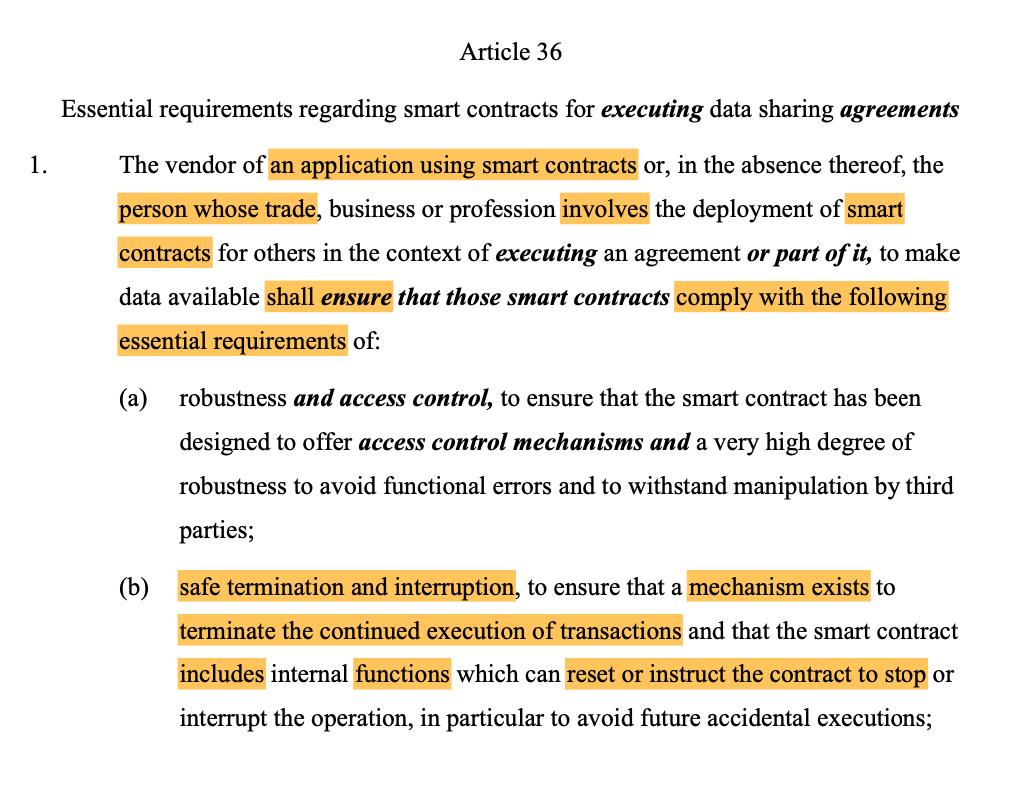
EU legislation introduces "kill switch" for smart contracts
The European Parliament has approved the Data Act, a controversial piece of legislation that includes a clause requiring smart contracts to have a "kill switch." The legislation, which passed with a majority of votes in favor, stipulates that smart contracts must be able to be interrupted and terminated. However, this requirement contradicts the foundational principles of blockchain technology, which emphasizes decentralization.
Uncertainty surrounds implementation and impact
The implementation and impact of these kill switches on the development and use of smart contracts remain unclear. Legal experts have raised concerns that the definition of a smart contract in the Data Act is too broad and could encompass computer programs that are not traditionally considered smart contracts. As a result, some companies may choose not to use smart contracts in their applications to comply with the legislation's requirements.
Centralization concerns
Experts worry that the introduction of a kill switch introduces a centralized element to smart contracts, potentially eroding trust in their reliability. Users may be reluctant to rely on contracts that can be modified or shut down by external entities. The enforcement of the kill switch and the potential consequences for non-compliance are also uncertain.
Regulation may hinder blockchain innovation
Blockchain innovators fear that the strict requirements and conformity assessments imposed by the Data Act could hinder blockchain innovation in the EU. The regulation may create burdensome compliance processes and discourage companies from using smart contracts in their applications.

Increased standardization could promote blockchain adoption
Despite concerns, the Data Act includes provisions that request European standardization organizations to draft harmonized standards for smart contracts. This increased standardization could strengthen the use of blockchain technology in the EU and potentially lead to greater adoption of smart contracts beyond data sharing agreements governed by the Data Act.
Regulatory oversight and user protections
As regulatory oversight of cryptocurrency companies increases, many have embraced transparency and detailed reporting to comply with applicable directives. Experts compare the development of rules around blockchain technology to safety and standards regulations for automobiles. While regulations may discourage some hardliners, they can also provide basic user protections and attract skeptics and newcomers to the crypto market.
Challenges for smart contract adoption
The EU's Data Act may pose challenges for smart contract adoption, including additional compliance requirements and strict data obligations. Developers may face delays and increased costs when deploying smart contracts, and the functionality of these contracts may be compromised by third-party interventions or interference.
EU leads in regulating data-driven industries
The EU is known for being cautious and regulation-focused, particularly when it comes to data-driven industries. In contrast, the US lacks federal smart contract laws and has relatively few state laws on the matter. The EU's approach focuses on setting standards and procedures for digital currencies, while the US emphasizes asset classification and promotional messaging.
Preparing for the future
While the Data Act is still to be passed into law, the blockchain industry has time to prepare for its potential impact. The true scope and consequences of the legislation will only become clear once it is in effect.
Did you miss our previous article...
https://trendinginthenews.com/crypto-currency/spot-bitcoin-etfs-and-decentralized-etfs-a-gamechanger-for-the-cryptocurrency-industry






